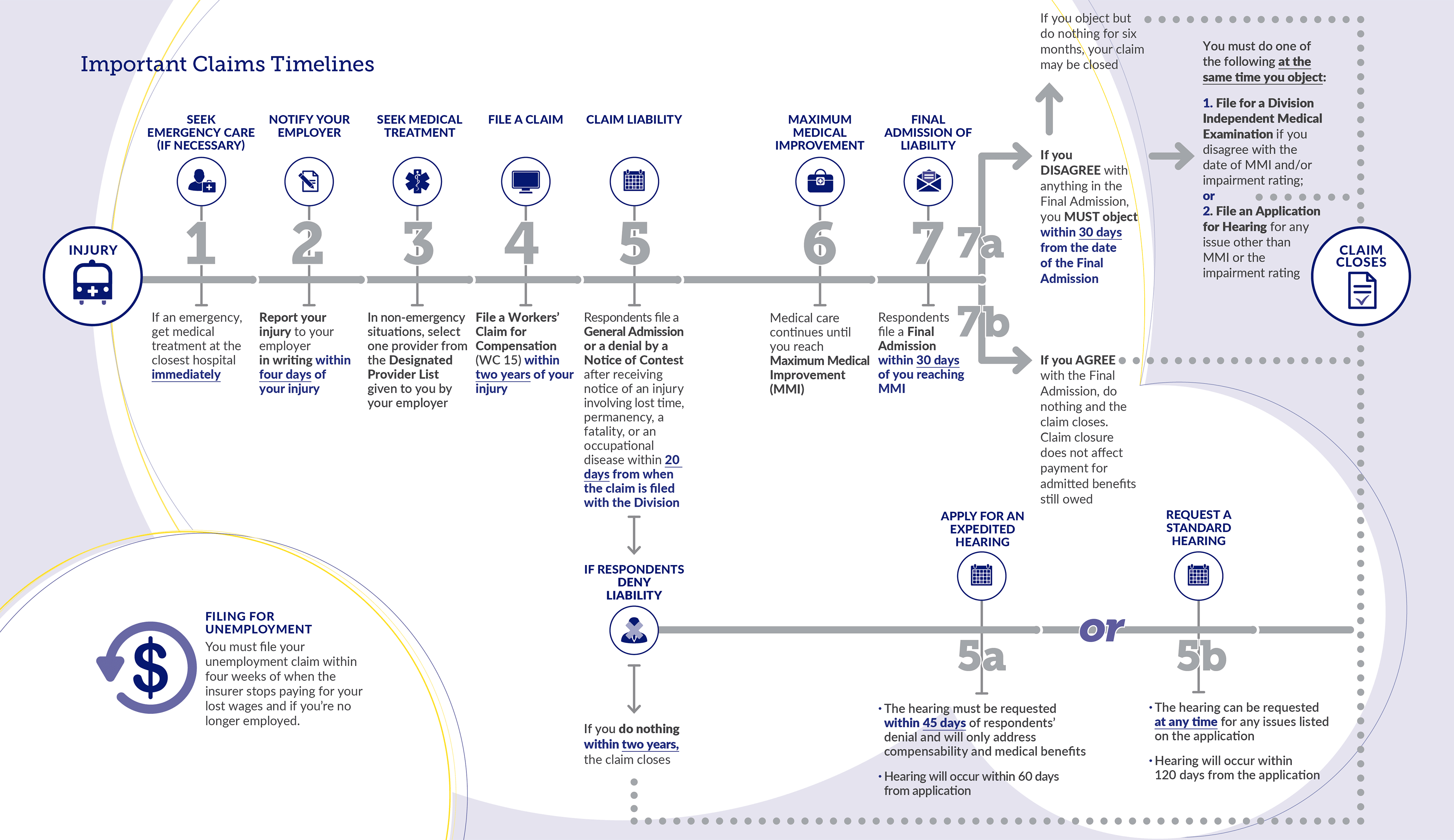Colorado Springs & Southern Colorado Workers’ Compensation Attorney
Were you or a loved one seriously injured at work?
Find out how representation by an experienced Colorado Springs lawyer who specializes in workers’ compensation, like Mack Babcock, can more than double your settlement amount.
Colorado Springs is the second-most populous city in Colorado and the proud home of the U.S. Air Force Academy, Fort Peterson Air Force Base (AFB), the North American Aerospace Defense Command (NORAD) and dozens of national sports governing bodies such as the United States Olympic Committee, the United States Olympic Training Center, USA Swimming and USA Hockey. Thanks in part to the city’s strong military economy, as well as the booming aerospace, high-tech and tourism industries, forecasters predict that Colorado Springs will soon overtake Denver as the state’s largest city.
By far, the U.S. military is the largest employer in El Paso County and the greater Colorado Springs metro area, accounting for roughly 1 in 5 jobs in the area. Fort Carson, the Air Force Academy, Fort Peterson AFB and NORAD employ tens of thousands of residents. Other major private employers include Hewlett-Packard, Memorial Hospital, Penrose-St. Francis Health Services, WorldCom, Amtel and Compassion International.
Whether you work for the military, a massive corporation, a nonprofit or a small business, Colorado laws are clear that most public and private employers are required to carry workers’ compensation insurance if they have at least 1 full-time or part-time employee.
As the Colorado Springs area continues to grow, there is also bound to be a rise in the number of reported work-related accidents, injuries and occupational illnesses. These workers’ compensation claims may be complicated if your request for benefits is denied or if you are seeking compensation from a government agency.
For example, federal government employees may be covered under the Federal Employees Compensation Act (FECA), which is an entirely different system than what covers most other Colorado workers. For starters, FECA claims have different eligibility requirements and deadlines that you need to know about.
If you or a loved one suffered an injury at work, you can most likely receive workers’ compensation benefits from your employer or their insurer. Unfortunately, injured workers often have to fight for their rights under state and federal workers’ compensation laws. This battle for the benefits you deserve can take a tremendous toll on you and your family.
We’ll always be there for you through the whole process. Every step of the way.
Meet a Colorado Springs work injury lawyer who won’t give up when fighting for your rights
“I quickly became very familiar with how insurance companies treat accident victims – how faceless corporations play with people’s lives when they’re at their very worst. This is part of the reason I decided to found my own practice. At the Babcock Law Firm, we will never represent an insurance company or other member of corporate America.”
For Mack Babcock, workers’ compensation isn’t just another practice area—it’s his main focus and passion. It’s why he founded The Babcock Law Firm after working for large insurance companies and corporations like Pinnacol Assurance, State Farm, Hartford, Sentry Insurance, Qwest Communications, Furniture Row and others. This background gives him unique insight and experience in dealing with workers’ compensation insurance companies to ensure his clients are treated fairly.
Mack belongs to a number of prestigious legal associations, including the Colorado and Denver Bar Associations, the Colorado Trial Lawyers Association, the Workers’ Compensation Educational Association, the Colorado Professionals in Workers’ Compensation and the Workers’ Injury Law & Advocacy Group. He has received many honors and awards, including:
- “Top Attorneys in Denver” by 5280 Magazine (2015)
- “Rising Stars” by Super Lawyers (2010, 2012)
- Colorado Super Lawyers (2019)
- Top Injured Workers’ Attorney by WILG (2015)
- Perfect 10.0 rating from Avvo.com
“I found Mack Babcock and the entire firm to be highly professional yet very personable. They took the time to explain each step of the way. Mack was very thorough in his explanation whenever I had questions or needed clarification. I would highly recommend Mack and his team to anyone who has been forced to navigate the complex landscape of workers compensation. Thank you Mack, Jan and Aiden, it was such a pleasure working with all of you!”
Workers hurt on the job aren’t told everything they should know
Know your rights under Colorado worker injury laws.
When you or a loved one are hurt on the job, the unfortunate truth is that you can’t trust the word of your employer or their insurance company to fully inform you of your rights and duties under workers’ compensation law. This is because these companies have a financial interest in stopping you from filing a workers’ compensation claim—or at the very least, minimizing how much they have to pay.
Time and time again, we have seen relationships between faithful, hard-working employees and their employer change for the worse after a work injury. It feels like just when you need their support most, your employer simply views you as a cost.
Here’s the reality:
One of these rights is the freedom to consult with a workers’ compensation attorney about your case, and this is one of the best steps you can take following an injury at work.
We invite you to discuss the details of your Colorado workers’ compensation claim with a lawyer at The Babcock Firm – whether you’re in Colorado Springs, Pueblo, Denver, Boulder, Aurora, Fort Collins or another CO city.
If your case falls within our practice area and we feel our representation can benefit you, a workers’ compensation lawyer will meet with you for an in-depth consultation at no charge.
Workers’ comp FAQ
How does workers’ compensation work in Colorado?
Workers’ compensation is a state-run insurance system managed by the Colorado Department of Labor & Employment’s Division of Workers’ Compensation, which is based in Denver. The crux of the law, known as the “Workers’ Compensation Act of Colorado,” can be found in Title 8, Articles 40-47.
In short, workers’ compensation guarantees financial compensation for medical bills and lost wages caused by a work-related injury or illness. Workers’ comp is a no-fault system, meaning injured workers can receive benefits regardless of who or what caused their injury—so long as the injury or illness occurred in the course and scope of employment.
Workers’ comp differs from unemployment benefits in that a worker must have been injured on the job (or been diagnosed with an occupational illness) in order to collect workers’ comp benefits. Unemployment benefits, on the other hand, are provided to workers who aren’t necessarily injured but lost their job due to no fault of their own.
What is the purpose of workers’ compensation in Colorado?
The purpose of the Act is to:
“…assure the quick and efficient delivery of disability and medical benefits to injured workers at a reasonable cost to employers, without the necessity of any litigation, recognizing that the workers’ compensation system in Colorado is based on a mutual renunciation of common law rights and defenses by employers and employees alike.”
The modern workers’ compensation system is sometimes referred to as the “Grand Bargain” between workers and employers. This is because both parties benefit the system, but at a cost.
Employees benefit because the no-fault system is designed to expedite the process of obtaining compensation. Employers, companies and insurers benefit because workers’ compensation is an “exclusive remedy,” meaning that injured workers generally can’t sue their employer if they’re covered by workers’ comp.
What should I do if I’m hurt at work?
According to the Colorado Department of Labor & Employment, you should take the following steps after suffering a work-related injury, illness or other medical condition:
- Seek medical care. If your injury is an emergency and/or life-threatening, you should seek emergency medical care from the nearest hospital immediately. If the condition is not an emergency, you can select a doctor from your employer’s list of designated healthcare providers. Your employer is obligated to provide you with this list within 7 days after you notify them about your injury.
- Report your injury. You should report your injury or condition to your employer as soon as possible, but no later than 4 days. This should be done in writing to provide a record that you met this requirement.
- File a claim. You must complete and submit for WC15 (Workers’ Claim for Compensation) with the Division of Workers’ Compensation within 2 years of your injury. You should do this whether or not your employer has workers’ compensation insurance. You can mail or deliver 2 copies of the form to: Colorado Division of Workers’ Compensation, Customer Service Unit at 633 17th St., Suite 400, Denver, CO 80202-3626.
- Understand potential benefits. After you’ve filed your claim, you should study up on the different types of workers’ comp benefits you may be owed, such as lost wages, disability and medical treatment reimbursement. Properly calculating the amount of benefits you can receive is a complicated task that may depend on many different factors, like your ability to return to work, the severity of your injury and how much you earned prior to the accident. A knowledgeable workers’ compensation attorney will be able to help you understand your potential benefits.
- Resolve or reopen your claim. Lastly, if your request for benefits is denied or you are unhappy with the payment offered, you can appeal the decision by requesting a hearing with the Office of Administrative Courts. It’s vital that you seek counsel from an experienced attorney to help you navigate the entire litigation process from pre-hearing and settlement mediation to discovery and the hearing.
How long do I have to file a workers’ compensation claim?
The “statute of limitations” is the time period within which a workers’ comp claim must be filed and it varies by state.
Here in Colorado, an injured worker must report their injury to their employer immediately, but no later than 4 days. Then, they must file a claim as soon as possible, but no later than 2 years after the injury. In certain cases, judges may grant an extension, but this is rare.
Review the chart below (provided by the Colorado Department of Labor & Employment) for more information:
What benefits does workers’ comp provide?
In the event of a worker injury or illness, workers’ compensation can provide financial assistance to help cover the injured worker’s:
- Medical care. Any emergency medical testing or treatment you require for your work-related injury should be covered by workers’ compensation. Non-emergency care will also be covered so long as you visit an employer-approved provider. This includes your travel expenses going to and from doctor’s appointments, as well as mileage and parking costs.
- Lost wages. If you had to miss work due to your injury or illness, then you may be paid every 2 weeks for temporary partial (TPD) or total (TTD) disability—generally at a rate of two-thirds of your average weekly wage. These benefits won’t be paid unless you miss more than 3 shifts. If you miss more than 2 weeks, then you’ll be compensated for these 3 missed shifts as well.
- Permanent disability. If you still suffer certain impairments after reaching maximum medical improvement (MMI), then you may be eligible for permanent partial (PPD) or permanent total (PTD) disability benefits. You may also be entitled to a disfigurement award if your injury resulted in serious and permanent disfigurement.
In the event of a worker’s death, their surviving dependents may receive payments for lost wages every 2 weeks, as well as up to $7,000 for funeral and burial costs. These death benefits will be paid until the surviving spouse dies or remarries, and dependent children will receive compensation until their 18th birthday (or 21st birthday if they are full-time students). If there is no surviving spouse or child, other relatives such as a parent, grandparent, sister or brother may be eligible for partial benefits.
While workers’ compensation benefits are not taxable, they may be subject to certain offsets if you are receiving financial assistance through any other government program such as unemployment, Social Security or short-term disability provided by your employer—or if you must pay child support.
Furthermore, your benefits may be reduced if you failed a drug test or violated a safety rule.
If the doctor your employer’s workers’ compensation insurance carrier sent you to draw a conclusion you feel will not adequately address your injuries, there IS a mechanism to make a change… albeit not quite as simple as changing your family doctor.
What if my employer doesn’t have workers’ compensation?
With few exceptions, all private and public employers in Colorado are required to carry workers’ compensation insurance if they have more than 1 employee. If they fail to meet this requirement, then they may face disciplinary action such as fines and the injured worker may be able to pursue legal action against them.
Even if your employer is uninsured, you should still file a workers’ compensation claim with the CO Department of Labor & Employment by submitting form WC15 as you may be eligible for benefits through the Colorado Uninsured Employer Fund.
What’s the average payout for workers’ compensation?
While the Division of Workers’ Compensation has an online Benefits Calculator to help injured workers understand how much compensation they might be owed, it’s important to realize that this tool (and others like it) can’t guarantee what benefits you may receive. This is because workers’ compensation awards and settlements can vary greatly depending on the unique factors of each case.
For example, a minor case of whiplash from a work-related car accident may require little treatment and heal in time, costing the injured worker just a few hundred dollars in the end. In contrast, a traumatic brain injury from falling off scaffolding can require months of intensive medical treatment and therapy to recover, if recovery is even possible at all. Such cases frequently add up to hundreds of thousands (even millions) of dollars in medical care, lost wages and permanent disability.
Can I quit my job while on workers’ compensation in Colorado?
Yes, you can quit your job at any time in Colorado—even after you suffer a work injury and are receiving benefits. Also, Colorado workers are protected from being fired because they filed a workers’ compensation claim.
However, it’s important to understand how quitting your job might affect your workers’ compensation benefits. For example, your lost wage payments may be stopped, which is why you should consult with your attorney before quitting.
Why do employers fight workers’ comp claims?
Even when workers have legitimate reasons to file a workers’ compensation claim, they often face roadblocks put up by their employer. Perhaps your employer wishes to avoid having their insurance premiums increase, or maybe they don’t want the company to get a bad reputation as an unsafe workplace.
Whatever their reason, don’t let your employer intimidate you or talk you out of filing a workers’ compensation claim. It’s your right to seek financial reimbursement in the event of a workplace injury or illness, and the workers’ compensation system—though not perfect—is designed to protect this right.
Where can I find a Colorado Springs workers’ comp attorney near me to help with my claim?
The workers’ compensation process can be frustratingly complex—much more than injured workers often realize. It can seem like an endless obstacle course filled with paperwork, deadlines, red tape and legal hoops you have to jump through—just to get the compensation you are entitled to under the law.
Rest assured that this complexity is no accident.
The insurance industry and employers benefit to the tune of millions of dollars each year from injured workers and their families who accidentally miss a deadline, forget to submit the right form or simply get tired of fighting.
At The Babcock Law Firm, we can fight vigorously on your behalf so that you can rest easy knowing that your best interests are being represented. Focus on your healing and recovery, and let us:
- Calculate the real value of your claim
- Submit the necessary paperwork
- Meet important filing deadlines
- Gather medical evidence and testimony to strengthen your case
- Prepare for your workers’ compensation hearing
- Help you find the best medical providers who will look after your well-being
- Navigate the complexities of discovery, mediation and appeals
- Negotiate with insurers and employers on your behalf
We understand that, as a result of your accident, you may already be in a difficult financial situation prior to seeking our services. Whatever the situation, it’s unrealistic to expect you to be able to pay thousands of dollars a month on an ongoing basis for legal representation.
We perform case work on contingency – so you can get the representation you need. We don’t get paid until a successful recovery is made, either through a settlement, jury award or judge’s decision. Our fees are based on a percentage. While these may vary depending on the case, it’s usually 25% for workers’ compensation, and between 33% and 40% for personal injury and insurance disputes.
Top articles from our legal library
- Can I be denied CO workers’ comp from smoking legal marijuana?
- Workplace injuries and pre-existing conditions
- Injury, drug testing & workers’ comp benefits
- What if my workers’ comp doctor is not providing the proper care?
- Lump sum payments of permanent disability benefits
- When to hire a Colorado workers’ comp lawyer
Free on-the-job injury resources
Colorado workers’ comp guide free e-bookA one-stop resource which is specially designed for injured workers and family members.
Guide to obtaining your workers’ comp benefitsLearn more about Colorado workers’ comp benefits that an experienced attorney can help you obtain.







